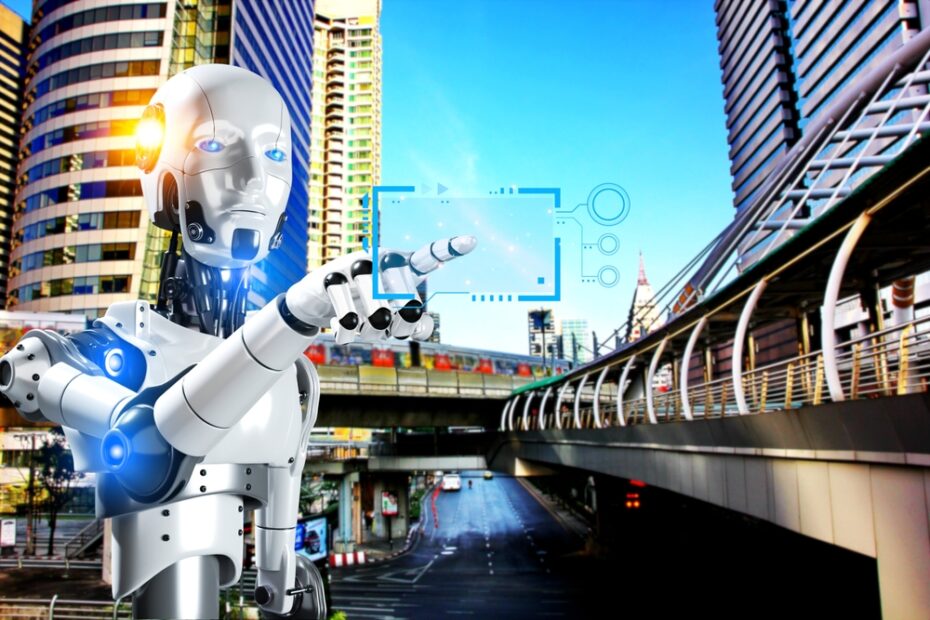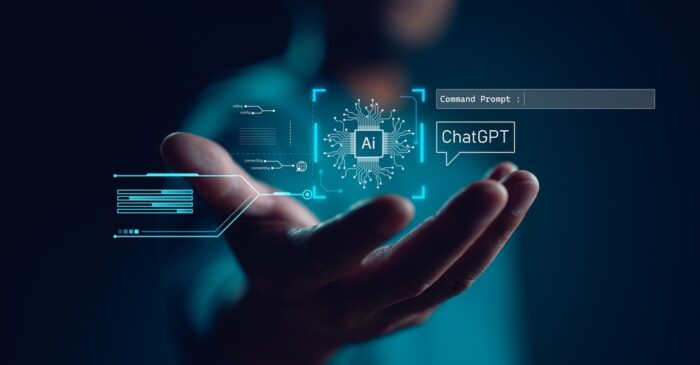New Study Finds That 80% Of The U.S. Workforce Could Have Their Jobs Affected By A.I. Like ChatGPT

Buckle up, the future is here.
If you work in a tech or communications field, AI language models like OpenAI’s GPT-4 are on the tip of everyone’s tongue. Bill Gates recently called this technology “the most advanced technological breakthrough since the 1980s.”
The bottom line is that machine learning AI and chatbots like ChatGPT are disrupting work by streamlining communication and automating tasks in a human-like way. This drives efficiency and innovation.
But here’s the thing: Widespread adaptation isn’t always overnight. Even though ChatGPT has millions of users, it takes time to develop a new workplace skill set – especially when it needs to be adapted by the management and creative class.
Think: Corporate America learning personal computers in the late 1970s – early 1990s.
Related: 13 AI-Powered Websites To Help You Work Faster
How is AI helping workers and productivity?
On March 16, Microsoft CEO Satya Nadella said in a presentation that “We believe this next generation of AI will unlock a new wave of productivity growth: powerful copilots designed to remove the drudgery from our daily tasks and jobs, freeing us to rediscover the joy of creation.” Microsoft recently added OpenAI generative AI features to Microsoft 365 suite of business software. The product, integrated into Microsoft products such as Word, Powerpoint, and Excel, is called Copilot.
OpenAI introduced GPT-4 in mid-March, an enhanced iteration of the underlying technology that powers ChatGPT.
Though the technology is still a work in progress (…and there are countless examples of chatbot factual errors, which was especially embarrassing for Google’s Bard), these AI language models can help automate repetitive tasks, including drafting emails, generating content ideas, helping programmers code, and summarizing lengthy documents. These prompt-based communications tools can reduce the need for specific hires to do specific tasks, potentially resulting in significant cost-savings for a business.
And, yes, they’ll even write you a song or tell you a joke.
This is a sea change for the world of marketing, advertising, public relations, and journalism – basically any field where people cobble together words to get a message out to others.
The cream will still rise, of course. Many future of work theorists believe that AI compliments skills, not replaces them.
With that in mind, it’s not all doom and gloom. After all, a sophisticated supercomputer is only as good as the brain of an operator who knows how to ethically capitalize on this new technology.

Will your job be affected by ChatGPT?
Two studies recently analyzed the impact GPTs will have, broadly, on the labor market.
In early March, a group of professors from New York University, Princeton, and the University of Pennsylvania recently published a paper asking this very question.
The paper, titled “How Will Language Modelers like ChatGPT Affect Occupations and Industries?”, specifically called out professions that deal with language arts, finance, and law as being the most “exposed” to AI.
“We find that the top occupations exposed to language modeling include telemarketers and a variety of post-secondary teachers such as English language and literature, foreign language and literature, and history teachers,” the researchers writer. “We find the top industries exposed to advances in language modeling are legal services and securities, commodities, and investments.”
In a Twitter thread, NYU researcher Rob Seamans called out the occupations most exposed to this brave new world:
- Telemarketers
- English Language and Literature Teachers, Postsecondary
- Foreign Language and Literature Teachers, Postsecondary
- History Teachers, Postsecondary
- Law Teachers, Postsecondary
Seamus also called out specific industries the most likely to be exposed to AI:
- Legal Services
- Securities, Commodity Contracts, and Other Financial Investments
- Agencies, Brokerages, and Other Insurance Activities
- Insurance and Employee Benefit Funds
- Nondepository Credit Intermediation
The study estimated a rubric matching GPT’s capabilities with job skill data cross-referenced to the US Department of Labor’s O*NET database, which lists occupations and the skills associated with them.
The rise of AI could affect over 80% of the U.S. workforce
Another recently published paper by researchers from OpenAI and the University of Pennsylvania states the scope of exposure GPT will have on the labor market, using similar O*NET data.
“Our findings indicate that approximately 80% of the U.S. workforce could have at least 10% of their work tasks affected by the introduction of GPTs,” the researchers write. “While around 19% of workers may see at least 50% of their tasks impacted. The influence spans all wage levels, with higher-income jobs potentially facing greater exposure. Notably, the impact is not limited to industries with higher recent productivity growth.”
Related: The Best Advice Bill Gates Has Ever Received Came From Warren Buffett
The study found that skills jobs that prioritize science and critical thinking will be less affected by the rise of AI in the workplace:
“Our findings indicate that the importance of science and critical thinking skills are strongly negatively associated with exposure, suggesting that occupations requiring these skills are less likely to be impacted by current language models,” the researchers write. “Conversely, programming and writing skills show a strong positive association with exposure, implying that occupations involving these skills are more susceptible to being influenced by language models.”
The jobs that were 100 percent exposed include mathematicians, tax preparers, financial quantitative analysts, writers and authors, and web and digital interface designers.
This paper also calls out the various industries most and least likely to be impacted by GPTs.
According to the study, industries like data processing, hosting, publishing, and security commodity contracts are the most susceptible to disruption. On the other hand, industries heavily dependent on manual labor appear to face the least potential impact. This includes many manufacturing industries, food services, mining, forestry and logging, social assistance, and couriers, listed towards the bottom of a graph.
OpenAI published a paper on whose jobs are most under threat 🫣 pic.twitter.com/WZbnoEpI8k
— Ric Burton (@ricburton) March 20, 2023
In conclusion
There’s no doubt that AI language models like ChatGPT are poised to revolutionize various fields. It’s transforming the way we communicate and collaborate in front of our very eyes.
Like all change, it’s both exciting and nerve-wracking simultaneously. Especially for knowledge industry workers.
There’s the potential for a game-changing impact on industries such as marketing and advertising, where content generation and audience targeting reach new heights. Journalism will thrive with lightning-fast research. The corporate world will witness skyrocketing efficiency as AI streamlines communication, and customer service becomes a seamless, personalized experience. Meanwhile, the education sector will see a burst of innovation with AI-enhanced learning materials and tutoring.
But innovation is never easy. It will certainly take human capital, smarts, and old-fashioned hustle for everyone to feel comfortable with it.
The dawn of this new era promises to reshape multiple fields in ways we can only imagine.